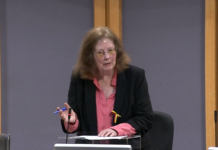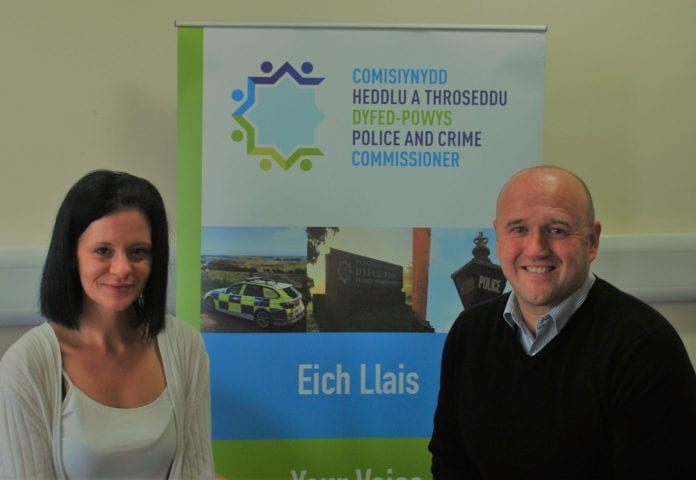A new initiative was launched on the 1st November which will aim to divert low level offenders away from the criminal justice system and reduce reoffending in the Dyfed-Powys Police force area.
The Diversion Scheme will enable eligible offenders to get the support and guidance they need to keep out of the criminal justice system. Only individuals who have committed a low level offence which is eligible for an out-of-court disposal will be accepted on to the scheme. Individuals identified as the highest risk of offending will be excluded from the scheme and will be dealt with via traditional criminal justice disposals.
A successful pilot of the scheme began in 2016 as a Women’s Pathfinder in Pembrokeshire. The pilot was widened in 2018 to a diversionary scheme for all eligible offenders in Pembrokeshire with an aim of providing a force-wide scheme.
Police and Crime Commissioner Dafydd Llywelyn said:
“I’m pleased to be in a position to see the new Diversionary scheme come to fruition in the force. This is a significant development from our initial pilot that focussed mainly on women offenders. Critically what it does is give people a second chance. When people come in to the criminal justice system, this is an opportunity for them to go through a diversionary scheme which will work with them as a person, trying to understand the reasons behind their offending and providing them with the appropriate help. Evidence shows that this approach leads to reductions in reoffending. By reducing the offending we obviously reduce the number of victims in the force area and that can only be a good thing for our communities.”
“I am looking forward to working with Pobl Care & Support who have been awarded the contract to provide the essential support and guidance to offenders within the Diversionary scheme.”
As part of the Pobl Group, Pobl Care & Support is a leading provider of care and support services to people living in Wales and the South West of England, specifically aimed at improving lives and enabling independence.
Annette Brenchley. Area Manager Pembrokeshire and Ceredigion, Pobl Care & Support, commented:
“From a provider’s perspective it’s a privilege to deliver such a culture and game changing initiative. Having worked on the pilot project we know this is a scheme that is evidenced to reduce demands on other services, impact positively on those who engage in the targeted programme of interventions and make our communities safer by reducing re-offending.”
PCC Llywelyn added:
“This initiative seeks to tackle the root cause of offending and associated health and community related issues. The multi-agency approach will seek to address offending behaviour at a much earlier stage in a person’s offending journey and improve awareness of and access to support services for eligible offenders committing low level offences.”
“I recently spoke to Maria Hardwick who, like many people, went through a very difficult time in her life. After coming into contact with the police she was offered, and benefitted greatly from being on, the Women’s pathfinder pilot in Pembrokeshire. I would like to thank Maria for being brave and willing to speak publically about her experience.”
Speaking about her experience on the scheme Maria said
“….it was a much needed intervention for me…” ……“I felt very supported, there was no judgement at all, no assumptions, so yes, a very valuable experience for me”……. “I’d highly recommend Pathfinders, if I can change so can anyone.”
Follow the link to the video to hear PCC Llywelyn talk about the scheme and to listen to Maria’s story https://www.dyfed-powys.police.uk/en/newsroom/press-releases/diversionary-scheme-launched-in-dyfed-powys-police-force-area/
Chief Constable Mark Collins said:
“This initiative will provide tailored support and intervention to those accepted onto the scheme at the earliest opportunity. Many low level offenders, like Maria, may possibly be victims themselves and the support they will receive will hopefully help them address underlying issues, build positive relationships and reduce re-offending across Dyfed-Powys.
Case studies from the Pembrokeshire Pilot scheme
(Please note the names in the case studies have been changed)
Case Study One:-
‘Sandra’ was arrested for theft, after taking items from a property she had been renting. She’s a single mother and both her children have significant health issues. ‘Sandra’ lives with health challenges herself too, suffering with continuous physical pain and this has had an adverse impact on her mental health.
The diversionary scheme helped ‘Sandra’ build a path towards a better future for her and her children. Upon entering the scheme, she was supported to complete a housing application form for accommodation appropriate to her family’s needs. ‘Sandra’ was helped to convey the daily challenges they face, in writing – something she had not been able to do previously. She’s reported sleeping better since moving to the new property and can feel improvements in both her anxiety and stress levels.
Significant debt was and remains a struggle for ‘Sandra’, but she has been signposted to people to help her manage the debt and while she continues to have difficulties discussing the detail of money owed, she is aware that the situation must be dealt with and is supported in facing this struggle.
When speaking about the support she has received via the diversionary scheme, ‘Sandra’ said:
“Why did no one tell me that support like yours was out there it took me to become involved with the Police for me to receive help that I have needed for a long time.”
Case Study Two:-
‘Chloe’ had a history of alcohol misuse which impacted on her behaviour. When she had been drinking she felt, in her words, “manic and not safe” so she then would call the police and on several occasions had attacked the officers, which resulted in her arrest. There had also been situations when, in ‘Chloe’s opinion’, her calls were not responded to appropriately. This led to her making suicide threats and to an incident involving carrying a weapon in a public place.
‘Chloe’ was very embarrassed and sorry for her behaviour and felt it was the time for change. Under the diversionary scheme ‘Chloe’ was referred to the Dyfed Drug and Alcohol Service (DDAS) who helped her work on her drinking and provided counselling. As ‘Chloe’ had a prescription for anti-depressant medication an appointment was arranged with her Doctor for a medical review
‘Chloe’s confidence and self-esteem improved. She will continue to work with DDAS with the aim to stop using alcohol and is now ready to look for employment, having been unemployed for two years.
‘Chloe’ said that working with the diversionary scheme had
“…..changed my life. I have been listened to and I have looked forward to my appointments.”
Case Study Three:-
‘James’ had a serious dependency upon drugs and had hit a very low point when he was arrested. Following this he had successfully secured regular employment and had met a new girlfriend who had helped him start to turn his life around. Being in employment and no longer using drugs, it was important to him to maintain this and not relapse into the ‘high end’ drug use previously engaged in.
For this purpose ‘James’ was eager to participate in the Pathfinder scheme and meetings were arranged so that he didn’t miss any shifts in work. He was referred to DDAS to learn what he could do to avoid relapse, and what help was available should a relapse occur.
‘James’ intends to build on the second chance afforded to him by the Pembrokeshire Pathway Diversion Scheme (PPDS) and said they
“…. have been a huge help by sorting myself out, I can’t thank them enough.”
Case Study Four:-
‘Richard’ was arrested for a Public Order Offence and Possession of Drugs after going through a difficult time in his life. He had split up with his girlfriend, his business partner and his brother was seriously ill. He was under extreme mental stress at the time of his offence.
‘Richard’ recognised that he needed help, especially with getting assistance to improve his mental health. With the support of a Pathfinder worker he re-engaged with a Doctor and accessed local counselling. To further improve his mental wellbeing ‘Richard’ begun art therapy which was recommended by his mental health worker.
While he is currently on benefits, during his weekly meetings with ‘PPDS’, he has completed his CV and is actively looking for work.
‘Richard’ appreciates the opportunity that PPDS has given him stating,
‘I have nothing but praise for all the counsel and help that I have received from my Pathfinder worker. His humanity and genuine kindness has touched me in a profound way and I hope to continue to improve as a human being.”
Case Study Five:-
‘Carol had moved to Pembrokeshire to be nearer to her family. She had several physical health issues which impacted on her ability to work and she became less mobile and more reliant on friends and family. The death of her mother severely impacted on her mental health and with the added pressure from a family dispute, she got into financial difficulty. Then on the first anniversary of her mother’s death ‘Carol’ was arrested for shoplifting and consequently referred to the Pathfinder scheme.
After the Initial embarrassment of committing the office, ‘Carol’ began to trust her PPDS support worker and disclosed the full extent of the debts. Together with her support worker, she met with Citizens Advice Bureau to address her financial difficulties and also attended a medical review which resulted in an improvement to both her physical and mental health.
‘Carol’ was very grateful for the help and support she received from her PPDS support worker and now feels able to manage anything that she is presented with. She said
“I couldn’t believe that such a service existed that would offer help to someone who did something so stupid”.
Lansio Cynllun Dargyfeiriol yn Nyfed-Powys
Ar 1 Tachwedd, lansiwyd menter newydd a fydd yn anelu i ddargyfeirio troseddwyr lefel is rhag y system cyfiawnder troseddol a lleihau aildroseddu yn ardal Heddlu Dyfed-Powys.
Bydd y Cynllun Dargyfeiriol yn galluogi troseddwyr cymwys i gael y cymorth a’r arweiniad sydd angen arnynt i gadw allan o’r system cyfiawnder troseddol. Dim ond unigolion sydd wedi cyflawni trosedd lefel is ac sy’n gymwys ar gyfer gwarediad tu allan i’r llys fydd yn cael eu derbyn ar gyfer y cynllun. Bydd unigolion sydd wedi’u hadnabod fel y rhai sydd fwyaf tebygol o droseddu’n cael eu trin drwy warediadau cyfiawnder troseddol traddodiadol.
Cychwynnwyd treial llwyddiannus o’r cynllun yn 2016 fel Cynllun Braenaru ar gyfer Merched yn Sir Benfro. Ehangwyd hyn yn 2018 i gynllun dargyfeiriol ar gyfer pob troseddwr cymwys yn Sir Benfro, gyda’r nod o gyflwyno’r cynllun ar draws yr ardal heddlu.
Dywedodd Dafydd Llywelyn, Comisiynydd yr Heddlu a Throseddu:
“Mae’n dda gennyf fod mewn sefyllfa i weld y Cynllun Dargyfeiriol newydd yn dwyn ffrwyth yn yr heddlu. Mae hyn yn ddatblygiad sylweddol o’n cynllun peilot cychwynnol, a oedd yn canolbwyntio’n bennaf ar droseddwyr benywaidd. Yn hollbwysig, mae’n rhoi ail gyfle i bobl. Pan mae pobl yn ymuno â’r system cyfiawnder troseddol, mae hwn yn gyfle iddynt fynd trwy gynllun dargyfeiriol, a fydd yn gweithio gyda nhw fel person er mwyn ceisio deall y rhesymau dros eu hymddygiad, a rhoi cymorth priodol iddynt. Mae tystiolaeth yn dangos bod hyn yn lleihau aildroseddu. Drwy leihau’r troseddu, yn amlwg, byddwn ni’n lleihau nifer y dioddefwyr yn yr ardal heddlu, a dim ond peth da y gall hwnnw fod i’n cymunedau.
“Rwy’n edrych ymlaen at weithio gyda Gofal a Chymorth Pobl, sydd wedi derbyn y cytundeb i ddarparu’r cymorth ac arweiniad hollbwysig i droseddwyr o fewn y cynllun dargyfeiriol.”
Fel rhan o’r Grŵp Pobl, mae Cymorth a Gofal Pobl yn ddarparwr gwasanaethau gofal a chymorth blaenllaw i bobl sy’n byw yng Nghymru a De Orllewin Lloegr. Y bwriad yw gwella bywydau a galluogi annibyniaeth.
Dywedodd Annette Brenchley, Rheolwr Ardal Sir Benfro a Cheredigion, Gofal a Chymorth Pobl:
“O safbwynt darparwr, mae’n fraint cyflwyno menter sy’n newid diwylliant. Ar ôl gweithio ar y prosiect peilot, gwn fod hwn yn gynllun sy’n lleihau galw ar wasanaethau eraill, yn cael effaith gadarnhaol ar y rhai sy’n cymryd rhan yn y rhaglen dargedig o ymyriadau, ac yn gwneud ein cymunedau’n fwy diogel drwy leihau aildroseddu.”
Ychwanegodd CHTh Llywelyn:
“Mae’r fenter hon yn ceisio mynd i’r afael â gwraidd troseddu a materion iechyd a chymuned cysylltiedig. Bydd yr ymagwedd amlasiantaeth hon yn ceisio mynd i’r afael ag ymddygiad troseddol yn gynt o lawer yn ystod taith troseddu rhywun, a gwella ymwybyddiaeth o wasanaethau cymorth, a mynediad atynt, ar gyfer troseddwyr sy’n cyflawni troseddau lefel is.”
Yn ddiweddar, siaradais â Maria Hardwick, sydd, fel llawer, wedi bod trwy gyfnod anodd. Ar ôl dod i gysylltiad â’r heddlu, rhoddwyd cyfle iddi fod yn rhan o’r Cynllun Braenaru Merched yn Sir Benfro, a derbyniodd y cynnig hwnnw. Hoffwn ddiolch i Maria am fod yn ddewr ac yn barod i siarad yn gyhoeddus am ei phrofiad.”
Wrth siarad am ei phrofiad ar y cynllun dywedodd Maria
“Roedd yn ymyriad gwerthfawr roeddwn wir ei angen….” “Rwy’n teimlo fy mod i’n cael fy nghefnogi. Ni wnaeth neb fy marnu na gwneud rhagdybiaethau, felly, oedd, roedd y profiad yn werthfawr iawn i mi.”….. “Byddwn yn argymell y Cynllun Braenaru’n gryf. Os alla i newid, gall unrhyw un newid.
Dilynwch y ddolen i glywed PCC Llywelyn yn siarad am y cynllun ac i wrando ar stori Maria.
Dywedodd y Prif Gwnstabl Mark Collins:
“Bydd y fenter hon yn darparu ymyrraeth a chymorth wedi’i deilwra i’r rhai sy’n cael eu derbyn ar gyfer y cynllun mor gyflym â phosibl. Gall nifer o droseddwyr lefel is, fel Maria, fod yn ddioddefwyr eu hunain, a’r gobaith yw y bydd y cymorth y byddant yn ei dderbyn yn eu helpu i fynd i’r afael â materion gwaelodol, adeiladu perthnasau cadarnhaol, a lleihau aildroseddu ledled Dyfed-Powys.
Help keep news FREE for our readers
Supporting your local community newspaper/online news outlet is crucial now more than ever. If you believe in independent journalism, then consider making a valuable contribution by making a one-time or monthly donation. We operate in rural areas where providing unbiased news can be challenging. Read More About Supporting The West Wales Chronicle























